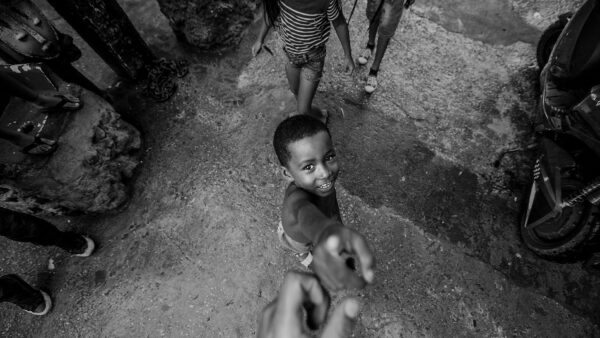Being a Missionary Changed My Life
This article was originally posted on January 29th, 2022, on Adventist Review.
The heavy shelling began abruptly in the South Sudanese capital, Juba.
Argentine missionary doctor Peter Fenoy immediately ran out of his office on the compound of the regional headquarters of the Seventh-day Adventist church. Security training had taught him about the danger of staying in a building during an attack. If a shell hit the building, he was more likely to be injured than if he was on the street. It was safest to be on the ground, lying near a wall.
Peter saw adults lying on the ground, and children were running. He heard shells falling. He looked around for his wife, Natasha. She was nowhere in sight.
A woman watching over smiling school-children.
“Natasha! Natasha!” he called.
Running back into the building, he found Natasha sitting at her computer typing a work report.
“What are you doing?” he cried.
Natasha looked up. Her face was expressionless.
“If it happens, it happens,” she said. “If not, it wasn’t our time.”
It was then that Peter understood how deeply Natasha had been scarred as a child by civil war in her birthplace of South Ossetia in the former Soviet Union. As the shells fell in South Sudan, she felt nothing. Her attitude was “If I die, I die.”
Peter and Natasha had moved to South Sudan to bring healing to people affected by a 22-year civil war. Their three-year stint also ended up providing healing to Natasha as she overcame childhood trauma and learned that war is not normal after all.
“When I came to Africa, I learned how abnormal it is,” Natasha said. “I had never heard about the trauma that armed conflicts leave on a person and how they change the personality.”
Natasha’s heart-changing experience has been repeated in the lives of many missionaries, church leaders said. Every missionary who surrenders to the Holy Spirit experiences a change of heart. Missionaries may go to share the gospel, but discover the gospel making a difference in their own hearts.
“The one thing I hear over and over is some variation of the expression ‘I expected to help the people, but in fact I’m the one who has been blessed,’ ” said Gary Krause, director of Adventist Mission and a former missionary kid. “In fact, I hear it so often that it has almost become a cliché.”
Change is required just to become a missionary, said Oscar Osindo, interim director of the General Conference’s Institute of World Mission, which provides cross-cultural training for all church missionaries. By accepting the call to serve, a missionary leaves a familiar culture and travels into the unknown following the example of Jesus, who left the comfort of heaven for the dark earth.
A child looks up and points to the hand of a missionary leading this child and his friends.
“As missionaries incarnate the life of Christ in a different culture, they see themselves in others, and the cross of Christ breaks the dividing wall with others,” Osindo said. “The blood of Christ unites the two into one humanity, and the missionary will never be the same again.”
Thousands of Seventh-day Adventists have left their homes to fulfill the Great Commission of Jesus, who said, “Go therefore and make disciples of all the nations, baptizing them in the name of the Father and of the Son and of the Holy Spirit, teaching them to observe all things that I have commanded you” (Matt. 28:19, 20). Currently about 400 families are serving as long-term ISE (Interdivision Service Employees) missionaries, while hundreds go every year as short-term AVS (Adventist Volunteer Service) volunteers. They also go as Global Mission pioneers, reaching out to unreached people groups in their own countries; tentmakers, who use their professions to work in restricted countries; and volunteers with the Asia-based 1000 Missionary Movement and supporting ministries such as Adventist Frontier Missions in the United States.
Most missionaries seek to grow and change in order to fulfill their calling, said Cheryl Doss, a longtime missionary and recently retired director of the Institute of World Mission. “The experiences they face, the intercultural challenges they deal with, the trials and tribulations that always come in the mission field, mean they have to change or break,” she said. “Most change into people with beautiful servant hearts open to the needs of the world.”
Only missionaries who resolutely resist fail to experience any changes in their lives, Osindo said, adding that those who resist “never finish their terms, or they struggle.”
Missionaries who surrender to God and allow their hearts to be moulded by Him have remarkable stories, he said. “They learn to trust more in the Lord, and they live to tell incredible stories,” he said.



